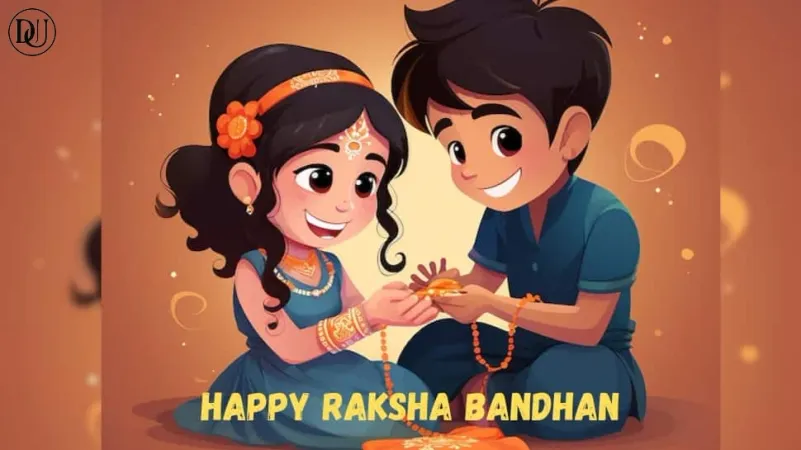You know, it’s funny how we think we know a festival – like Raksha Bandhan, right? Most of us picture the same scene: sister ties a thread, brother gives a gift, maybe some sweets. But honestly, it’s so much more varied across India than I ever really thought. It randomly hit me earlier tonight, thinking about a trip I took last year. The sheer diversity of how it's celebrated, it's pretty wild. It's not just a uniform thing, not at all.
The Core of the Bond: Beyond the Thread 🎗️
At its heart, Raksha Bandhan is about protection, this deep bond between siblings – not always blood relatives, mind you, sometimes it's just a promise of care. It’s essentially a Hindu festival, falling on the full moon day of the Shravana month. That’s what the name ‘Raksha Bandhan’ literally translates to, right? A bond of protection. It’s steeped in, like, ancient mythology. Stories about Indra and Indrani, even Krishna and Draupadi. You've heard those, I'm sure. It really underscores this idea of a sister's plea for safety and a brother's vow to provide it. It's a significant date on the calendar, typically with a precise 'shubh muhurat' or auspicious time for the rituals.
![]()
North India’s Familiar Rituals 🎁
Up north, particularly in states like Punjab, Haryana, Uttar Pradesh, and Rajasthan, you see the most common version, the one everyone globally associates with Rakhi. Sisters prepare a thali with a diya, sweets, and the sacred thread. They perform aarti, put a tilak on their brother's forehead, then tie the Rakhi. The brother usually gives a gift – cash, or some token. It’s quite a family affair, a time for reunions. Everyone dresses up, there's special food. It’s kind of the quintessential Raksha Bandhan image, I guess.
West India: Coastal & Cultural Nuances 🌊
Move west, and things get really interesting. In Maharashtra, for instance, Raksha Bandhan often coincides with 'Nariyal Purnima' – the Coconut Full Moon. Here, it’s not just about siblings. The fishing communities, especially, have this really cool tradition where they offer coconuts to the sea god Varuna, seeking his blessings for safety on the waters. They thank the sea, which is, like, their livelihood. While siblings still exchange Rakhi, this maritime connection is a huge part of the day there. It’s a beautiful blend of cultural gratitude and familial affection. Could be wrong, but it feels like a really pragmatic, yet spiritual, take on the festival, you know?
East India’s Unique Celebrations 🌳
Then you hit the East, places like West Bengal and Odisha. Here, it’s often linked with 'Jhulan Purnima' – especially in Bengal. This is a celebration dedicated to Lord Krishna and Radha, involving swings decorated with flowers. Rakhi itself is celebrated, of course, but there's an added spiritual layer, a devotion aspect that’s woven into the festivities. Also, in some parts, people tie Rakhi to trees as well – like the Banyan tree – symbolizing a wish for protection of nature. That’s a really thoughtful twist, isn’t it? It connects the human bond to a larger environmental reverence, which is something I’ve noticed pop up in other festivals too.
![]()
Southern Perspectives: Less Prominent, Yet Present ✨
It’s a bit different down south. Raksha Bandhan isn't as widely or overtly celebrated as a major festival in Tamil Nadu, Kerala, or Andhra Pradesh compared to the north. However, many communities still observe it, often in a more subdued way, or as 'Avani Avittam' for Brahmin communities. 'Avani Avittam' is when Brahmins change their sacred thread (the 'poonool' or 'yagnopaveetam') and renew their commitment to Vedic studies. While not directly 'Rakhi,' it shares that theme of renewal and spiritual protection. It’s like, the underlying sentiment of duty and spiritual well-being is there, just manifested differently. You see that with a lot of pan-Indian festivals – different names, different rituals, same spiritual heart.
Modern Adaptations & Enduring Significance 💖
These days, Raksha Bandhan has evolved quite a bit. It’s not strictly brother-sister anymore. People tie Rakhis to friends, cousins, even neighbors – anyone they share a bond of protection and affection with. It’s really become a symbol of universal kinship, which is honestly quite nice to see. Gifts have gotten fancier too, beyond just cash – gadgets, clothes, experiences. But here’s the thing, despite all the regional variations and modern twists, the core message remains. It's about that unbreakable promise of looking out for each other. That mutual respect, the sense of security that comes from knowing someone has your back. Is that really surprising? Some things, like family and connection, they transcend all the little differences. Anyway, just thinking about how deep these cultural roots go, it’s pretty amazing.










